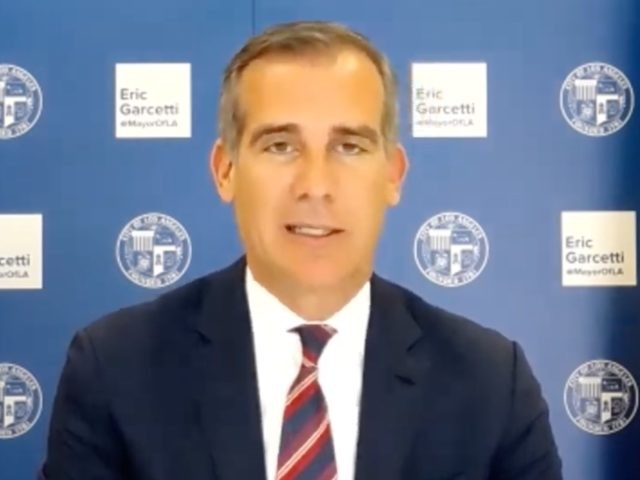Los Angeles Mayor Eric Garcetti, whose city is suffering from homelessness, economic disruption, and drought, launched a nationwide commission on slavery reparations on Friday, Mayors Organized for Reparations and Equity (MORE).
Garcetti appeared with several urban mayors via streaming video as the federal government observed Juneteenth for the first time as a public holiday (since June 19 is on Saturday this year).
Garcetti cited past racist policies in the U.S, including segregation. “These are tough things to face, for many in America,” he said. “But they are part of our collective history.”
Garcetti said mayors were coming together “with an open heart, and a determined gut.” He said it was impossible to address inequality between blacks and whites “without addressing the trauma of slavery,” though it ended 156 years ago.
Garcetti, citing an author he called “Ta-Nahasi Coates” [sic], quoted Ta-Nehisi Coates’s admonition to his teenage son in his recent bestselling book about race: “The entire narrative of this country stands against the truth of who you are.”
MORE, he said, would unite mayors in three commitments: first, to support congressional legislation for a commission on reparations; second, to form a “black-led” advisory committee to consult with mayors about reparations; and third, to create “pilot reparations programs” targeted at “a cohort of black residents.” It was unclear how Garcetti would justify doing that in legal terms, given the Constitution’s prohibition on racial discrimination under the 14th Amendment.
Last year, during the Black Lives Matter protests and riots, Breitbart News asked Garcetti to define “systemic racism.” He said:
Systemic racism is racism that’s built into systems. Slavery was systemic racism. Segregation is systemic racism. The idea that a child who is born into a black family, on average, that family has $17,000 of wealth, and a white family has $171,000 of wealth? That’s economic systemic racism. Freed slaves were promised “forty acres and a mule.” Didn’t get it. Reparations are an attempt to look at righting the wrong of systemic racism. Systemic racism is the idea that, as I just heard from even my fellow elected officials, you can be a powerful black man in America, and you’re still going to get pulled over all the time, in a way that our white counterparts aren’t. That is — systemic racism means that there are systems set up, both in and by government, as well as in our economy, and our private sector, in our schools, and in our communities, that systematically — they aren’t just an individual, the difference is in individual racism, somebody who makes a[n] individual decision that is racist — when, collectively, these have folks who are African American more likely to be homeless, more likely to be in jail, more likely to be of poor health, more likely to to be under-educated, more likely to be under-employed or unemployed. That’s the result of a system. The counter is, a lot of people say, “Oh, that’s just people’s personal choices.” Try starting at the starting line fifty yards behind everybody else. And then you tell me if everything is equal. That’s what this moment is about. And I think that, while there are some who still want to push back on that, the marvelous thing is, this is finally a moment when, overwhelmingly, America gets it. The question is now, for all of us: what are you going to do about it?
Other mayors participating in the MORE conference included Austin, Texas, Mayor Steve Adler; Sacramento, California, Mayor Darrell Steinberg; and Providence, Rhode Island, Mayor Jorge Elorza, among others.
The Black Lives Matter movement has protested against Garcetti for years, calling him the “worst mayor in the nation” and demanding after the election that President Joe Biden deny him a position in his incoming administration.
Joel B. Pollak is Senior Editor-at-Large at Breitbart News and the host of Breitbart News Sunday on Sirius XM Patriot on Sunday evenings from 7 p.m. to 10 p.m. ET (4 p.m. to 7 p.m. PT). His new novel, Joubert Park, tells the story of a Jewish family in South Africa at the dawn of the apartheid era. His recent book, RED NOVEMBER, recounts the 2020 Democratic presidential primary from a conservative perspective. He is a winner of the 2018 Robert Novak Journalism Alumni Fellowship. Follow him on Twitter at @joelpollak.

COMMENTS
Please let us know if you're having issues with commenting.